No products in the cart.

A staunch believer in the unity and oneness of Nigeria, Chief Obafemi Awolowo, also known as Awo by many, was a visionary leader, astute statesman, intellectual giant, and profound preacher of federalism. These qualities would cause him to stand out amongst his peers at the time.
Awolowo rose from the ashes to become the first Premier of the Western Region of Nigeria. He was an important leader of the Action Group Party who fought for Nigeria’s Independence and played a pivotal role in the Nigeria-Biafra War.
Obafemi Awolowo is deified among many Nigerians, especially his Yoruba kinsmen, for his leadership skills and his brand of politics, popularly known as Awoism. His ardent followers are referred to as Awoists.
Contents
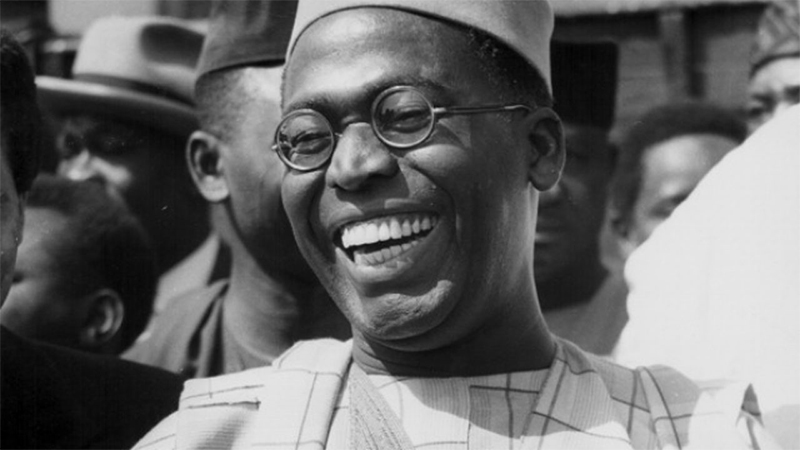
At his death in 1987, Emeka Ojukwu, in a tribute, described Awolowo as the “best President Nigeria never had.”
This episode examines the life and times of Obafemi Awolowo, his political career, his trial and imprisonment, and, of course, his role as Finance Minister during the Nigeria-Biafra War.
Early Life and Education
Obafemi Awolowo was born Jeremiah Oyeniyi Obafemi Awolowo, on March 6, 1909, to the Christian family of Chief David Sopolu Awolowo and Mary Efunyela Awolowo in Ikenne, Remo, present-day Ogun State.
At the start of the First World War in 1914, Awolowo attended Saint Saviours Anglican School, Ikenne. He soon showed off his brilliance in his academics, edging out his peers.
In 1920, the senior Awolowo died. This event hindered his educational career for a few years. As a result, he had to take on several menial jobs, such as selling firewood and as a houseboy from one master to another, to support his schooling.
Awolowo was an exceptional student. He maintained top grades in his elementary school subjects and went on to top his class throughout his junior school.
In 1927, he proceeded to Wesley College, Ibadan – a teachers’ college where he had his higher education. There, he displayed an astounding level of determination and tenacity to succeed. He also exhibited a high level of resentment and intolerance for discrimination and inequality which was engendered by the seniors and targeted at junior students. This string of events and leadership roles enkindled his interest in Law and would prepare him for his ultimate purpose.
Soon after he graduated from Wesley College, he enrolled in a distance learning programme where he took courses in English, Commercial Knowledge, Booking, Business Methods and Shorthand. He worked as a Shorthand typist for a while so he could earn money to further his career.
In 1944, he proceeded to the University of London where he studied as an external student. In 1946, he was awarded the degree of Bachelor of Commerce (Hons.) and the Bachelor of Law (L.LB). On November 19, 1946, he was called to the Bar by the Honourable Society of the Inner Temple.
The following year in 1947, Obafemi Awolowo went on to publish a book titled: “Path to Nigerian Freedom which advocated for Federalism as the best form of government for Nigeria. The book became recognised as the most important and impressive view of Nigeria’s future political development written by a nationalist politician.
Political Career
As a young man, Obafemi Awolowo joined the principal nationalist movement at the time – the Nigerian Youth Movement (NYM). He was actively involved in various unions, significantly, the Nigerian Motor Transport Union, the Nigerian Produce Traders Association and the Traders’ Union Congress of Nigeria.
He would go on to become the Secretary of the Nigerian Motor Transport Union and the NYM. Eventually, Awolowo would become the leader of the NYM which became a Yoruba-dominated organisation under his administration, until he left for the United Kingdom in 1944 to study Law.
While at the University of London, Obafemi Awolowo founded the Egbe Omo Oduduwa – a unifying body for the spread of the cultural identity and political unity and development of the Yoruba. He was so passionate about the Yoruba people that he is revered by many to this day. Awolowo’s political ideologies and philosophies were people-centred as he sought only the welfare of the people.
Upon his return to Nigeria in 1948, Obafemi Awolowo established branches of the society throughout the South-West. He soon became the leading proponent of Yoruba nationalism. He focused his energy primarily on the welfare of the Yoruba people and ensured their support for his leadership in order to control the political scene in the Western Region.
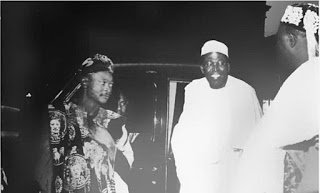
Following the creation of the Egbe Omo Oduduwa, identical cultural organisations sprung up from the different regions of the country. There were the Ibo Federal Union, established in 1944 to foster unity and promote Igbo progress in the East, and the Bauchi General Improvement Union established in 1943 in the North.
Obafemi Awolowo founded the Action Group Party in 1951 and became its first President. He would go on to win the first Western Region elections in the same year. In 1954, he became the first Premier of the Western Region. His administration was strategic in local government, finance and economic planning. From 1954 to 1959, Awolowo, as Premier, ensured involvement in education, social services and agricultural practices.
As of 1959, it was obvious there were three main regions in the country – the Eastern Region, dominated by the Igbo; the Northern Region, dominated by the Hausa and Fulani people; and the Western Region dominated by the Yoruba.
Thus, there were three major political parties from each region – the National Convention of Nigerian Citizens (NCNC) from the Eastern Region, led by Dr Nnamdi Azikiwe; the Northern People’s Congress (NPC) from the Northern Region, led by Sir Ahmadu Bello; and the Action Group Party (AG) from the Western Region, led by Chief Obafemi Awolowo.
In 1959, prior to the General Elections, Awolowo resigned from his post as Premier of the Western Region to contest a seat in the Federal House of Representatives in Lagos. Awolowo then became the leader of the opposition party, with the NCNC and NPC, taking lead roles in the nation.
Chief Samuel Ladoke Akintola, the Deputy President of the Action Group Party at the time, became Premier of the Western Region.
Trial and Imprisonment
Awolowo, as leader of the opposition, sought to cement his party’s stronghold in the West while Akintola advocated forging closer links with the Federal Government. This would lead to a power tussle between both men, and the eventual expulsion of Akintola from the party. This led to chaos in the region, and the Federal Government had to step in, declaring a state of emergency in the West.
In 1962, an inquiry into Awolowo’s five-year tenure was initiated. Known as the Coker Commission, it was headed by Justice George Baptist Ayodola Coker.
Ladoke Akintola was absolved of any wrongdoing and was reinstated as premier.

In 1963, Obafemi Awolowo was convicted and charged with a treasonable felony and jailed for 10 years. He was, however, pardoned by the Federal Military Government in 1967 and became a member of the Supreme Military Council in the months leading to the Nigerian Civil War.
Obafemi Awolowo’s Role in the Nigerian Civil War
Chief Obafemi Awolowo was a member of the National Conciliation Committee which served as a mediator between the Federal Government and the Eastern Region. All attempts at mediation failed, and Awolowo pulled his weight behind the Federal Government after Emeka Ojukwu, the Biafran leader, declared secession in 1967.
As Finance Minister and Leading Adviser to Yakubu Gowon, the Head of State, Obafemi Awolowo was instrumental in the success of Nigeria during the Civil War using starvation as one of the weapons of war. He also pushed for the economic blockade of Biafra and made it nearly impossible for food and other forms of aid to get to the breakaway country.
Awolowo also influenced Gowon to change the Nigerian currency, hence incapacitating Biafra’s ability to trade.
While his role was somewhat controversial, Awolowo pushed for the unity of Nigeria. He believed in the oneness of the nation as he was mindful of Biafra’s secession which could lead to the breakaway of other regions and the eventual dissolution of Nigeria.
Post-Civil War
After the war, in the mid-1970s, Awolowo served as the Chancellor of the University of Ife (now Obafemi Awolowo University), Ile-Ife and Ahmadu Bello University in Zaria.
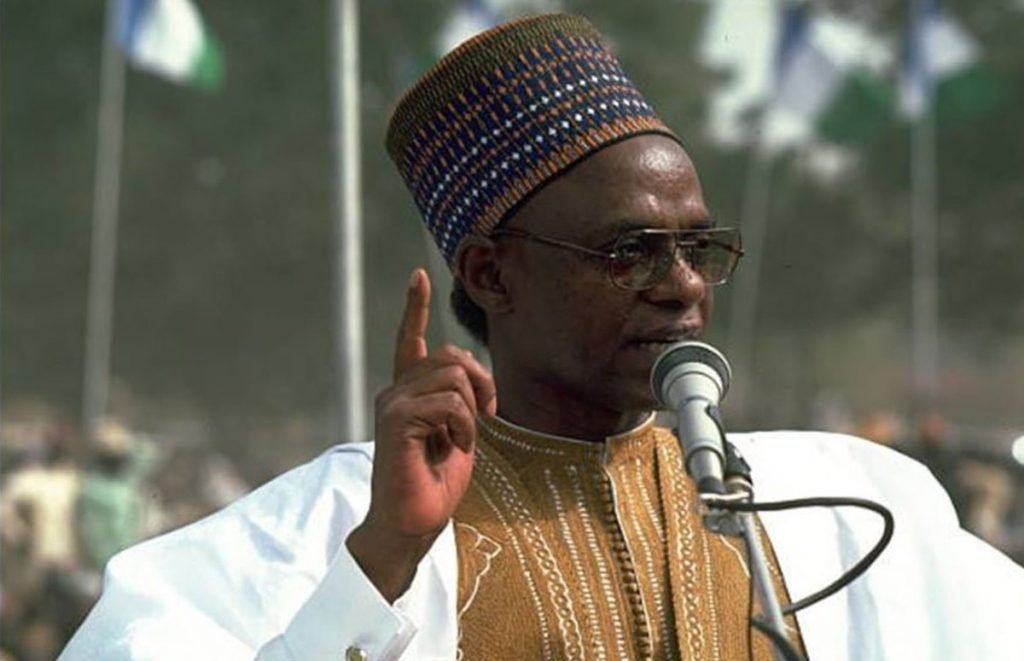
After the lifting of the ban on political activity in 1978, Nigeria prepared to return to civilian rule on October 1, 1979. Chief Awolowo emerged as the leader of the Unity Party of Nigeria (UPN) and contested for the office of the Presidency in the 1979 and 1983 elections. However, he was defeated both times by Shehu Shagari.
A few months into Shagari’s second term in 1983, another coup followed, and another ban was placed on political activities in the country.
This ended Chief Obafemi Awolowo’s political career and he subsequently retired from politics.
Awoism
Chief Obafemi Awolowo was consumed with the vision of setting Nigeria free from the shackles of European domination and the restoration of its dignity. Through visionary leadership, he was able to effect change, particularly in the Western Region where he served as Premier for five years.
Awolowo had a strong belief in the unity of Nigeria where he preached and advocated federalism. He devoted his time not only to the idea of federalism but also to put it into practice. He believed that the business of the government was the people.
The introduction of free universal primary education by Obafemi Awolowo in 1955, was a game-changer in the Western Region. His goal was to see all citizens educated. He had the principle of intellectual enormity. According to Awolowo, ignorance and illiteracy are major impediments to the achievement of good governance.

All of Obafemi Awolowo’s works were deeply entrenched in welfare politics. He believed that leadership is all about service. He wanted to serve and he also sought to lead. His slogan was “freedom for all, life more abundant”, and this drove his policies and the ideologies he lived by.
Obafemi Awolowo’s Achievements
The story of Chief Obafemi Awolowo, his rise from grass to grace, and the influence he wielded, during and after his lifetime, is a testament to his determination, doggedness, brilliance and intellectual prowess.
Awolowo is revered as the first man to become acknowledged as the “Asiwaju Awon Yoruba.”
During his tenure as Premier of the Western Region, he produced the most efficient civil service in Africa; he set up free basic education and free healthcare services across all parts of the West; he established the first TV Station in Africa; he built the Liberty Stadium, the first modern sports facility in Nigeria; his administration implemented the first minimum wage policy in Nigeria; Awolowo set up Nigeria’s first industrial complex at Ikeja, Lagos, and also Nigeria’s first commercial Housing Estates at Ikeja and Bodija in Ibadan.
Obafemi Awolowo’s administration created an efficient Western Nigeria Development Corporation and also helped revolutionise the production and marketing of cocoa farmers in Western Nigeria.
In 1982, President Shehu Shagari conferred on Awolowo the highest honour in Nigeria – the Grand Commander of the Federal Republic (GCFR).
Obafemi Awolowo was awarded several honorary degrees by different institutions including the University of Lagos, the University of Ife, Ile-Ife, the University of Ibadan, and the University of Nigeria, Nsukka, among others.
On May 12, 1987, three days after his death, the University of Ife, Ile-Ife, was named after him. It is now known as the Obafemi Awolowo University, Ile-Ife.
In 1968, the Liberian government awarded Awolowo the Grand Brand of the Order of the Star of Africa.
A notable writer, Awolowo published many books – some of which include: Path to Nigerian Freedom (1947), Awo: An Autobiography (1960), The People’s Republic (1968), The Strategy and Tactics of The People’s Republic (1970), among others.
In 1949, Obafemi Awolowo founded the oldest privately-owned newspaper in Nigeria – The Nigerian Tribune – a daily newspaper, based in Ibadan, that publishes to this day.
Personal Life and Death
On December 26, 1937, Obafemi Awolowo tied the knot with his heartthrob, former Miss Hannah Idowu Dideolu Adelana, the daughter of a respected leader at an Anglican Church in Ikenne. The couple were advocates of justice and the emancipation of man’s mind from ignorance and the shackles of colonisation.
Together, they had five children – Olusegun, Omotola, Oluwole, Ayodele and Tokunbo.
On May 9, 1987, Chief Obafemi Awolowo died. He was 78. Awolowo was survived by his wife, children, and many grandchildren. The most notable among these grandchildren is Dolapo Osinbajo, Nigeria’s Second Lady and wife of Nigeria’s Vice President, Professor Yemi Osinbajo.
Legacy
Among Nigeria’s founding fathers who fought for independence, Chief Obafemi Awolowo was, perhaps, the one with the most realistic view of the unity of a complex geographical area like Nigeria. His wit, insight and wisdom caused him to stand out amongst his peers like Nnamdi Azikiwe, Tafawa Balewa and Ahmadu Bello.
Awo, as Obafemi Awolowo was fondly called by his supporters during his lifetime, argued for true federalism as the best system of government for a country like Nigeria.
Also, Chief Obafemi Awolowo’s achievements as Premier, his trial and imprisonment in the First Republic, his role during the Nigeria-Biafra War and his failed attempts to become Nigeria’s president in the Second Republic will always be remembered.
We always have more stories to tell. So, make sure you are subscribed to our YouTube Channel and have pressed the bell button to receive notifications for interesting historical videos. Also, don’t hesitate to follow us on all our social media handles and to as well share this article with your friends.
Feel free to join our YouTube membership to enjoy awesome perks. More details here…
Leave a Reply
You must be logged in to post a comment.


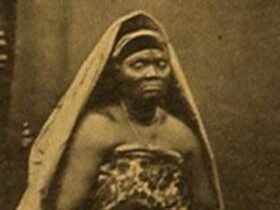
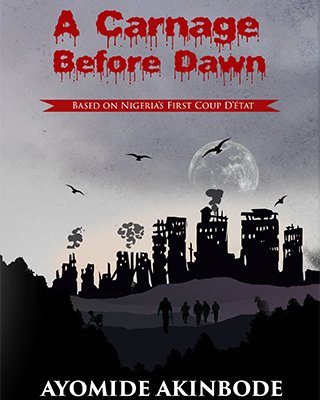




Leave a Reply
View Comments